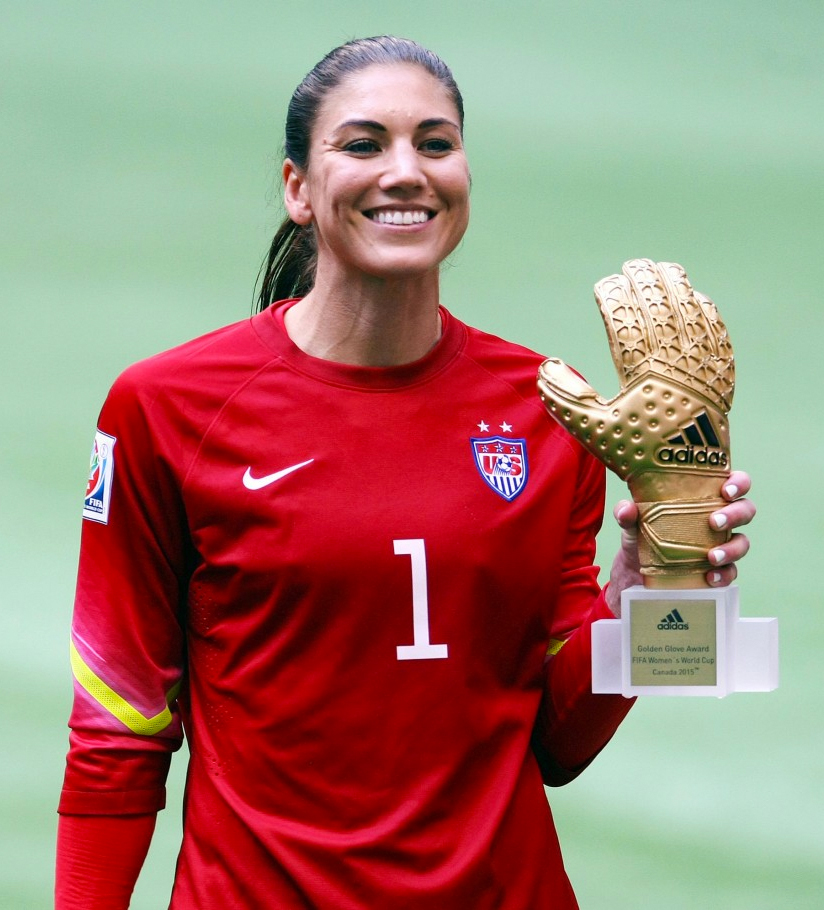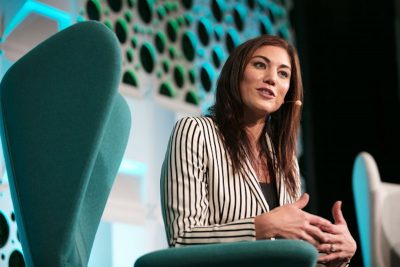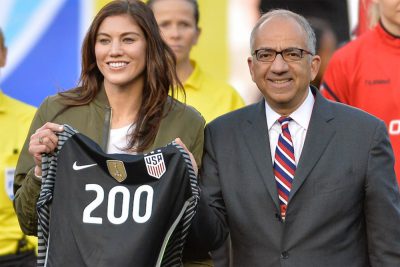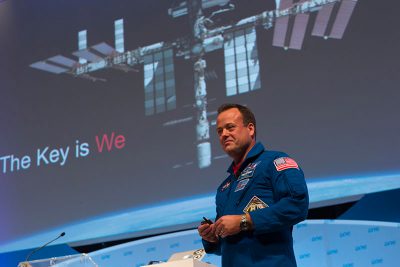WHY I’M RUNNING FOR PRESIDENT OF U.S. SOCCER
Ever since I was a young girl, all I ever wanted to do was to play soccer for the United States at the highest level. I wanted to win a World Cup and play in the Olympic Games. I was just a kid from a lower-middle class family in Richland, WA. I played with a reckless determination to win and a fearless belief that with my talent and my work ethic, I could accomplish my dreams.
I found myself on the U.S. U-14 team at the age of 12. I went on to play for the United States in every single age group. I spent the better part of 23 years working with the United States Soccer Federation (USSF). I know the system. I lived, and breathed the system. My life’s path was determined by their schedule.
I learned at an early age that my family didn’t have the means to pay for me to play club or Olympic Development Program (ODP) soccer. Year after year, I knocked on doors to get handouts from neighbors and family friends. My grandparents also supported my never-ending tournament fees. When I made my first regional pool and was asked to stay one extra week, it would have cost my family $500-$600 as a “reward” for their daughter being one of the best players in the region, an honor they could neither afford nor accept.
My parents said no.
My parents gave me a great life but they had no choice but to say “no” time and time again to the outrageous expenses that we would incur with every team, every tournament, and every camp. I was the best player in the state, but I couldn’t afford gas money to drive across the mountains to play in tournaments, stay two nights in the hotel and eat out.
There was a point in my ODP experience when even the State of Washington helped cover my costs of staying at regional team camps. My neighbors, my family, my coaches, and my state have all helped me reach my dreams. I learned early on as I climbed the ranks, that the majority of my teammates not only played at top clubs that I could never afford, but that they also had more than enough money to shop, to eat out and to buy all the latest soccer gear.
My mom advocated for my club team to not spend $75.00 on jerseys and another $35 on matching team bags, but to print numbers on t-shirts. We were one of the best teams in the state, regardless of not having matching Nike kits.
My whole life I knew that I was one of the few lucky kids living by the grace of others. I had so much support around me, but the reality was never lost on me. I very easily could have been just another kid lost to the system.
The systemic problem in U.S. Soccer starts at the youth level. Soccer has always been a middle class sport and in more recent times, has become an upper middle class sport. Some of the best clubs around the country charge each youth player between $3000-$5000 per season. I have personally witnessed young players heartbroken over the financial reality that they could no longer pursue their dream.
Yes, most club teams ‘scholarship’ kids in, but it is the responsibility of the USSF to develop the best youth in America. The system has been set up to discriminate and to overlook the disadvantaged because of an arrogant belief that the United States possesses the worlds best athletes, so therefore we can get away without having the world’s best soccer players. It is an outdated and a painfully evident reality that the National Teams currently face.
We need passionate and intelligent soccer people leading the way at U.S Soccer. The business strategy at U.S. Soccer cannot continue to be profit before progress. The heart of what USSF must represent is the development of youth soccer in America.
Progress is a process, but the system currently in place does not allow for progress to happen at the rate soccer purists would hope for. It’s the stubborn and elitist attitude of U.S. Soccer to continue down the path of capitalism first. My time in the negotiating room, as well as in countless meetings with USSF presidents, vice presidents, press officers, board members, attorneys and representatives, all the way down the line has given me firsthand experience in their business tactics and where their true goal lies. It has always been about the money.
But the question we all must ask ourselves is this: why does a “profitable” nonprofit organization with millions of dollars at its disposal not make the world’s most beloved sport accessible to all? Where do the massive amounts of money go?
I certainly don’t know, even after taking legal action to find out. As a player, as a representative of my team in negotiating a new Collective Bargaining Agreement (CBA), and as a Players Association member, we were never able to get answers to our questions with regard to where the millions of dollars from Soccer United Marketing (SUM) and sponsors go, or where the millions of dollars collected from the youth club fees go.
The USSF is a nonprofit organization that refuses to be transparent in its business dealings. It refuses to follow the Equal Pay Act that was passed more than 60 years ago, and despite reports to the contrary, the economic and financial terms of the new World Cup Champion U.S. Women’s National Team’s Collective Bargaining Agreement do not provide the USWNT equal pay, and are neither fair nor equitable.
This historical, immoral and unconscionable USSF conduct comes at an unacceptable cost: the cost of national pride, the cost of not qualifying for a Men’s World Cup, the cost of not providing the USWNT equal pay and telling the women on the USWNT that they do not deserve to be paid what the men get paid, the cost of actively engaging in gender discrimination, and most glaringly, the cost of overlooking talented young players from diverse socio-economic communities who, if given the opportunity to participate in the system, would develop an enormous, great pool of talent that could eventually populate our USWNT and USMNT’s and lead them to greatness.
I came from knocking on doors for support as a kid in the youth system to standing on the podium as World Cup Champion and feeling the full weight of support from our country. I spent my life in this system and I have seen the USSF’s best and worst days. And I have always believed that US Soccer was and will be again, the leaders of the global game.
What we have lost in America is belief in our system, in our coaches, in our talent pool, and in the governance of US Soccer. We now must refocus our goals and come together as a soccer community to bring about the changes we desire.
The time for talking is over. I have been traveling internationally learning and speaking about many of these issues. I have met with foreign national soccer teams player associations and unions. I have met with Presidents and members of the United Nations to discuss leadership and the importance of sport in the world order. Through all of these experiences, I have learned that it is the responsibility of those in leadership positions who have the ability to change policy to stop giving lip service to the issues, but to instead, execute and take the actions required to affect real change.
Given the opportunity, as President of the USSF, I will make these changes. Developing players skills at all levels and in all communities in order to get the most out of our national player pool, to ultimately develop the Men’s and Women’s National teams into perennial world champions, should be the USSF’s number one priority.
The only way for American soccer to propel itself on the world’s stage is by creating a culture that is diverse and by shedding a mentality that is no longer acceptable.
MY PLATFORM:
As President, I will lead on four core principles:
Create a Winning Culture at USSF
- Build a true American soccer “identity” like other great football nations
- Refocus the USSF on rebuilding a comprehensive development pathway using all available means
- Invest in robust player developmental programs at all levels
- Establish an exclusive soccer-only national training facility
Become The Global Leader in Equality and Women’s Issues
- Achieve Equal Pay for the USWNT and all women in the USSF workplace
- Push for the inclusion of women at all levels of the USSF executive and organizational hierarchy
- Eliminate sexism and discrimination
Make Soccer Accessible to All
- Address the issues of “pay to play”
- Demand socio-economic diversity and inclusion in USSF youth and developmental soccer clubs and USSF player developmental programs
Embody the Highest Standards of Transparency and Good Governance
- Ensure true organizational, operational and financial transparency
- Restructure the roles and functions of Executive Officers and Executive branch of the USSF
I know exactly what U.S. Soccer needs to do, I know exactly how to do it, and I possess the fortitude to get it done. I have always been willing to sacrifice for what I believe in and I believe there is no greater sacrifice then fighting for equal opportunity, integrity and honesty, especially in an organization like the USSF that could give so much more to our communities across the nation.
Soccer is the World’s game, and I want to share it with all of America.










